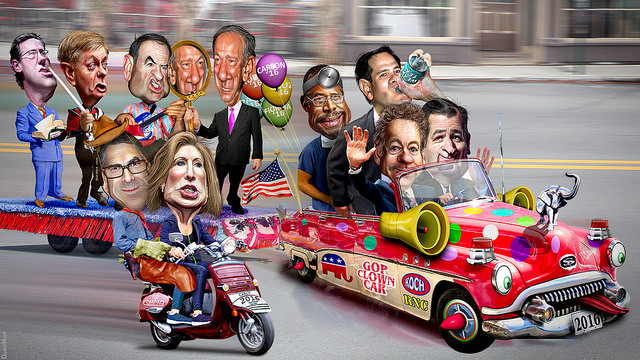Crash-Test Dummies as Republican Candidates for President
Paul Krugman
Will China’s stock crash trigger another global financial crisis? Probably not. Still, the big market swings of the past week have been a reminder that the next president may well have to deal with some of the same problems that faced George W. Bush and Barack Obama. Financial instability abides.
So this is a test: How would the men and women who would be president respond if crisis struck on their watch?
And the answer, on the Republican side at least, seems to be: with bluster and China-bashing. Nowhere is there a hint that any of the G.O.P. candidates understand the problem, or the steps that might be needed if the world economy hits another pothole.
Take, for example, Scott Walker, the governor of Wisconsin. Mr. Walker was supposed to be a formidable contender, part of his party’s “deep bench” of current or former governors who know how to get things done. So what was his suggestion to President Obama? Why, cancel the planned visit to America by Xi Jinping, China’s leader. That would fix things!
Then there’s Donald Trump, who likes to take an occasional break from his anti-immigrant diatribes to complain that China is taking advantage of America’s weak leadership. You might think that a swooning Chinese economy would fit awkwardly into that worldview. But no, he simply declared that U.S. markets seem troubled because Mr. Obama has let China “dictate the agenda.” What does that mean? I haven’t a clue — but neither does he.
By the way, five years ago there were real reasons to complain about China’s undervalued currency. But Chinese inflation and the rise of new competitors have largely eliminated that problem.
Back to the deep bench: Chris Christie, another governor who not long ago was touted as the next big thing, was more comprehensible. According to Mr. Christie, the reason U.S. markets were roiled by events in China was U.S. budget deficits, which he claims have put us in debt to the Chinese and hence made us vulnerable to their troubles. That almost rises to the level of a coherent economic story.
Did the U.S. market plunge because Chinese investors were cutting off credit? Well, no. If our debt to China were the problem, we would have seen U.S. interest rates spiking as China crashed. Instead, interest rates fell.
But there’s a slight excuse for Mr. Christie’s embrace of this particular fantasy: scare stories involving Chinese ownership of U.S. debt have been a Republican staple for years. They were, in particular, a favorite of Mitt Romney’s campaign in 2012.
And you can see why. “Obama is endangering America by borrowing from China” is a perfect political line, playing into deficit fetishism, xenophobia and the perennial claim that Democrats don’t stand up for America! America! America! It’s also complete nonsense, but that doesn’t seem to matter.
In fact, talking nonsense about economic crises is essentially a job requirement for anyone hoping to get the Republican presidential nomination.
To understand why, you need to go back to the politics of 2009, when the new Obama administration was trying to cope with the most terrifying crisis since the 1930s. The outgoing Bush administration had already engineered a bank bailout, but the Obama team reinforced this effort with a temporary program of deficit spending, while the Federal Reserve sought to bolster the economy by buying lots of assets.
And Republicans, across the board, predicted disaster. Deficit spending, they insisted, would cause soaring interest rates and bankruptcy; the Fed’s efforts would “debase the dollar” and produce runaway inflation.
None of it happened. Interest rates stayed very low, as did inflation. But the G.O.P. never acknowledged, after six full years of being wrong about everything, that the bad things it predicted failed to take place, or showed any willingness to rethink the doctrines that led to those bad predictions. Instead, the party’s leading figures kept talking, year after year, as if the disasters they had predicted were actually happening.
Now we’ve had a reminder that something like that last crisis could happen again — which means that we might need a repeat of the policies that helped limit the damage last time. But no Republican dares suggest such a thing.
Instead, even the supposedly sensible candidates call for destructive policies. Thus John Kasich is being portrayed as a different kind of Republican because as governor he approved Medicaid expansion in Ohio, but his signature initiative is a call for a balanced-budget amendment, which would cripple policy in a crisis.
The point is that one side of the political aisle has been utterly determined to learn nothing from the economic experiences of recent years. If one of these candidates ends up in the hot seat the next time crisis strikes, we should be very, very afraid.

No comments:
Post a Comment